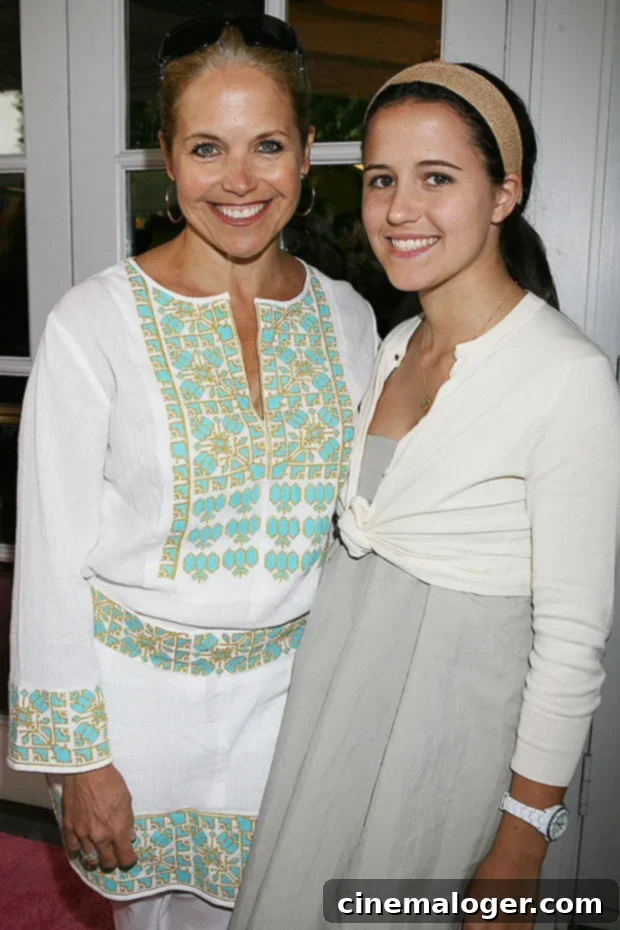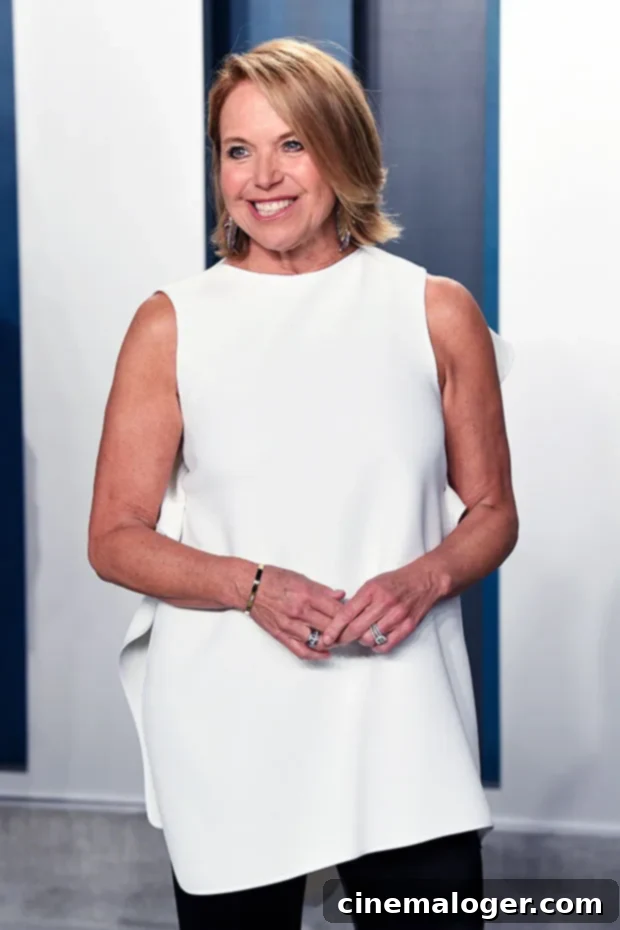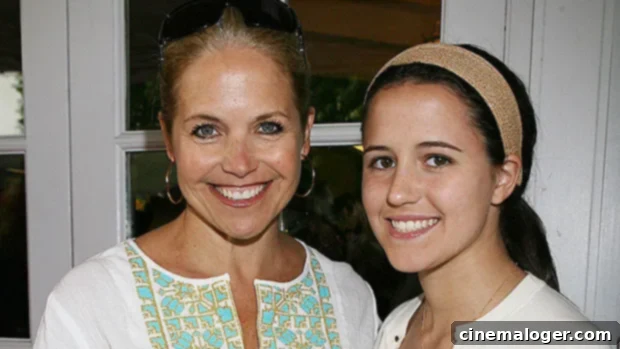Katie Couric and Daughter Ellie Monahan Lead Powerful Colon Cancer Awareness Campaign: Turning Personal Loss into a Public Health Mission
The fight against colon cancer is profoundly personal for media icon Katie Couric and her daughter Ellie Monahan. Twenty-four years after the devastating loss of husband and father Jay Monahan to the disease at the tragically young age of 42, the mother-daughter duo has once again stepped into the spotlight to champion colon cancer awareness. Their latest effort involves a heartfelt commercial for Cologuard, an at-home colon cancer screening test, where Katie openly shares the enduring pain of Jay’s passing in 1998 and articulates her unwavering dedication to preventing and treating this often-silent killer. This campaign is not merely an advertisement; it’s a powerful testament to a family’s resilience and a continuation of Katie’s quarter-century mission to spare others from similar heartbreak.

A Deeply Personal Battle: The Genesis of Katie Couric’s Advocacy
The year 1998 etched an indelible mark on Katie Couric’s life and became the catalyst for her lifelong advocacy. Jay Monahan, a brilliant legal analyst and Katie’s beloved first husband, was taken by colon cancer, leaving behind Katie and their two young daughters, Ellie and Carrie. This profound loss transformed Katie’s private grief into a public mission, driven by an urgent desire to prevent other families from enduring the same sorrow. Jay’s diagnosis was late, and despite their efforts, the aggressive nature of the disease claimed him too soon. This personal tragedy illuminated the critical importance of early detection and the dire consequences of late diagnosis, fueling Katie’s commitment to raising awareness about a cancer that, when caught early, is highly treatable and often preventable.
For more than two decades, Katie has leveraged her influential platform to demystify colon cancer and encourage screening. Her work has evolved from individual public service announcements to groundbreaking live television events, all aimed at fostering a culture where colon cancer screening is seen as a routine, life-saving measure rather than a source of discomfort or embarrassment. The Cologuard commercial featuring Ellie is the latest, poignant chapter in this ongoing narrative, demonstrating that the fight is generational and deeply embedded in their family’s story.
The Cologuard Campaign: A Mother-Daughter Plea for Prevention
In the new Cologuard commercial, Katie and Ellie create a tender scene, preparing dinner together in their home. The setting is intimate and relatable, a quiet moment between a mother and daughter, yet imbued with immense significance. As they cook, Katie’s voiceover gently guides viewers through her personal journey, explaining precisely why she committed to regular colon cancer screenings. “Colon cancer took him from us like it’s taken so many others,” Katie shares, her voice imbued with a quiet determination. “That’s why I’ve made it my mission to talk about getting screened.”
Ellie’s presence in the ad is not merely symbolic; it represents the living legacy of Jay Monahan and the generational impact of early detection. Her involvement underscores that colon cancer affects entire families, not just individuals. The commercial aims to reach a broad audience, emphasizing that while traditional colonoscopies are a gold standard, accessible options like Cologuard can play a vital role in early detection, especially for those who might be hesitant about more invasive procedures. Cologuard, an FDA-approved non-invasive stool DNA test, offers a convenient way for individuals 45 and older at average risk to screen for colon cancer from the comfort of their home, making it an invaluable tool in expanding screening accessibility.

Katie Couric’s Enduring Legacy of Advocacy: Breaking the Stigma
Katie Couric’s assertion that advocacy is her “mission” is not an exaggeration but a testament to her consistent, powerful efforts. Long before the Cologuard commercial, Katie made headlines in 2000 when she underwent a colonoscopy live on NBC’s The Today Show. This unprecedented act was a bold move aimed squarely at destigmatizing a procedure often viewed with apprehension or embarrassment. By openly sharing her experience, Katie demystified the process, showing millions of viewers that it was manageable and, most importantly, life-saving.
Her televised colonoscopy led to what scientists dubbed the “Couric Effect,” a measurable increase in colonoscopy screenings across the United States. This impact demonstrated the profound influence of personal storytelling and celebrity advocacy in public health. Katie has never shied away from reiterating the critical importance of regular screenings, understanding that for many, it can literally mean the difference between life and death. As she told People Magazine, “When this happened to Jay, I made it my personal mission to do everything I could to spare other families from going through what ours did.” Her advocacy is a direct, compassionate response to her own suffering, transformed into a powerful force for good.
Understanding Colon Cancer: Why Early Detection is Key
Colon cancer, or colorectal cancer, is the third most commonly diagnosed cancer and the second leading cause of cancer-related deaths in the United States when men and women are combined. Despite these alarming statistics, it is one of the most preventable and treatable cancers if detected early. This is precisely why Katie Couric’s message resonates so deeply.
The disease often begins as small, non-cancerous clumps of cells called polyps that form on the inner lining of the colon or rectum. Over time, some of these polyps can become cancerous. The insidious nature of colon cancer is that it often presents no symptoms in its early, highly curable stages. When symptoms do appear—such as changes in bowel habits, rectal bleeding, abdominal discomfort, or unexplained weight loss—the cancer may already be advanced.
Regular screening tests play a crucial role in detecting polyps before they turn into cancer, or catching cancer at an early stage when treatment is most effective. Screening options include colonoscopies, which allow doctors to view the entire colon and remove polyps during the procedure, and non-invasive stool-based tests like Cologuard. While guidelines traditionally recommended screening to begin at age 50, recent increases in colorectal cancer diagnoses among younger adults have led to updated recommendations, with screenings now suggested to start at age 45 for individuals at average risk. Knowing your family history and discussing screening options with your doctor are paramount steps in prevention.
The Profound Impact of Loss: Missed Milestones and a Call to Action
Katie and Jay Monahan married in 1989 and built a loving family, welcoming daughters Ellie and Carrie. While Carrie was unable to participate in the Cologuard ad due to travel constraints, her sister Ellie’s presence profoundly underlines the message that colon cancer robs families of invaluable moments. Katie eloquently speaks about the countless milestones Jay missed with his girls: proms, college graduations, and the poignant walk down the aisle on their wedding days. These are not just events; they are life-affirming moments that shape family memories and connections, irreplaceable threads in the fabric of life.
“You don’t have to miss these extraordinary life-affirming moments, because you were diagnosed with colon cancer,” Katie urged. “You can detect it early, and it can be treated and prevented.” This sentiment encapsulates the core of her advocacy. Her pain over Jay’s absence in these pivotal moments fuels her fierce determination to empower others. It transforms a personal tragedy into a universal plea, reminding everyone that proactive health measures can preserve futures and protect the precious bonds of family.
Ellie Monahan: Carrying Forward a Shared Legacy
Ellie Monahan, now 30, stands alongside her mother as a powerful voice in the colon cancer awareness movement. Her generation is particularly relevant given the troubling trend of rising colorectal cancer rates in younger adults. Her participation in the Cologuard campaign sends a clear signal that this disease is not just an older person’s concern but affects people of all ages. For Ellie, this cause is not an abstract concept; it is part of her identity, a shared legacy of love and loss with her mother.
By joining her mother, Ellie not only honors her father’s memory but also lends an authentic, relatable voice to younger audiences who might be overlooking the importance of early screening. The shared grief, combined with their collective hope for a healthier future, makes their mother-daughter partnership exceptionally compelling. It showcases that the commitment to awareness is not just Katie’s solitary fight but a family’s ongoing mission, passed down through generations, to save lives and foster a world where fewer families experience the devastation they endured.
Beyond the Commercial: A National Impact and Lasting Hope
Katie Couric’s influence extends far beyond a single commercial; she has been a driving force in national health discourse for decades. Her ability to connect deeply with audiences through her personal narrative has given colon cancer awareness a visibility that few other advocates could achieve. She has helped to dismantle barriers of discomfort and fear, fostering open conversations about a disease once relegated to hushed tones.
The Cologuard campaign, featuring Katie and Ellie, serves as a poignant reminder that while advancements in medicine provide new tools for detection, human connection and empathy remain at the heart of effective public health initiatives. Their message is one of hope, stressing that knowledge, vigilance, and proactive screening can alter devastating statistics and prevent countless tragedies. It is a powerful testament to the enduring human spirit, turning profound loss into a tireless effort to protect others. Their mission, born from a heartbreaking personal experience, continues to inspire millions to take control of their health, reminding us that early detection is not just a medical recommendation, but a profound act of self-care and love for those we cherish.
